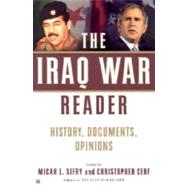Despite the torrent of coverage devoted to war with Iraq, woefully little attention has been paid to the history of the region, the policies that led to the conflict, and the daunting challenges that will confront America and the Middle East once the immediate crisis has ended. In this collection, Micah L. Sifry and Christopher Cerf, coeditors of the acclaimed Gulf War Reader, have assembled essays and documents that present an eminently readable, up-to-the-moment guide -- from every imaginable perspective -- to the continuing crisis in the Gulf and Middle East.
Here, in analysis and commentary from some of the world's leading writers and opinion makers -- and in the words of the key participants themselves -- is the engrossing saga of how oil economics, power politics, dreams of empire, nationalist yearnings, and religious fanaticism -- not to mention naked aggression, betrayal, and tragic miscalculation -- have conspired to bring us to the fateful collision of the West and the Arab world over Iraq. Contributors include:
Fouad Ajami
George W. Bush
Richard Butler
John le Carré
Noam Chomsky
Ann Coulter
Thomas Friedman
Al Gore
Seymour Hersh
Christopher Hitchens
Arianna Huffington
Saddam Hussein
Terry Jones
Robert Kagan
Charles Krauthammer
William Kristol
Nicholas Lemann
Kanan Makiya
Kevin Phillips
Kenneth Pollack
Colin Powell
Condoleezza Rice
Arundhati Roy
Edward Said
William Safire
Jonathan Schell
Susan Sontag
George Will









